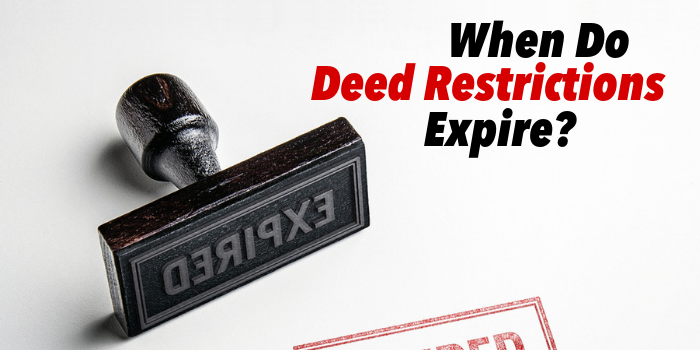Deed restrictions are legal requirements that dictate what a homeowner can and cannot do with his property. For example, mandating which colors a homeowner can paint their house, which building styles must be adhered to, how landscaping should look, etc. The HOA imposes deed restrictions in order to maintain the neighborhood’s look and feel, and to keep property values high.
Do deed restrictions expire?
Generally speaking, deed restrictions do not expire unless there is a specified, written expiration date. If there is a specific expiration date, it is possible for an HOA to vote to extend the time limit on the restriction. Information about covenant expiration is listed in the deed, or may be on file with the local government. Of course, there are exceptions to this rule – check with a legal advisor about the status of deed restrictions in your own community. Everything that you need to know should be listed in your community’s governing documents.
Are there any factors that would prevent a deed restriction from being enforced?
Deed restrictions cannot be enforced if they are illegal, vague, or out-of-date. A restriction cannot be enforced if it violates any local, state, or federal laws. Discriminatory deed restrictions have been ruled unconstitutional. Examples of illegal covenants are that owners cannot sell to non-whites, families with more than two children, or senior citizens. Changes in national law make such covenants not only illegal, but also unenforceable.
Vague deed restrictions are also unenforceable. Restrictions must be clear, detailed, and concise. If homeowners cannot be pointed to a clear, specific violation, then a restriction cannot be enforced. or example, stating that homeowners must ‘maintain the quality of the neighborhood’ is vague – it can reasonably be interpreted multiple ways. An out-of-date restriction would be a situation where, for example, the CC&Rs state that homeowners cannot build a shed; however, many owners have been granted waivers. Homeowners can then argue that the needs of the neighborhood have changed and the ban on sheds is pointless and outdated.
Is there any way to get out of a restrictive covenant?
Some restrictive covenants allow the homeowner to secure a waiver that will grant the homeowner an exception to that specific covenant.
What is a Deed of Release?
A Deed of Release is a legal document that releases the parties from previous legal obligations. The lender holds the title to a property until the terms of the mortgage have been fulfilled. Essentially, once a person pays off their mortgage loan, the lending institution will create a mortgage Deed of Release.
After the Deed of Release is assigned, the homeowner owns the asset and has no further obligation to the lender. A Deed of Release can also free a person from any obligations that they had under a previous agreement.







